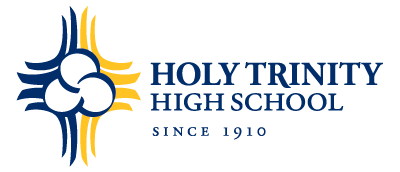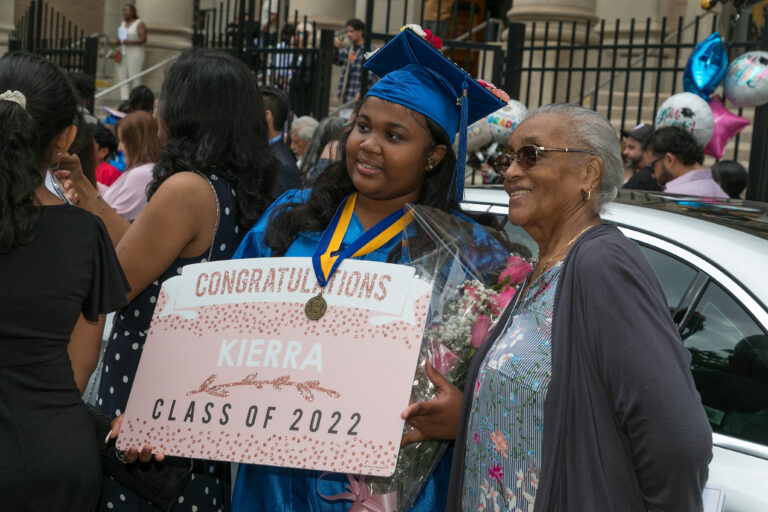Over the past five years, educators at Holy Trinity have doggedly pursued increasing our standards of academic excellence to ensure every student is prepared for success after high school. “As a college-preparatory school, we have made it our mission to ensure our curriculum exceeds higher education expectations by ramping up our graduation requirements and increasing the rigor of our curriculum while providing the academic support students need to achieve their full potential,” says Principal Marianne Lynch.
To that end, we have expanded our college-level courses, beginning with our Advanced Placement (AP) program. In 2014, just one AP course was offered. Today, we now offer seven AP classes, one in each department with the exceptions of religion and physical education. As we’ve increased our offerings, the students have directly benefitted: In 2014, 13 percent of AP test-takers scored 3 or better (the average score required to receive college credit). By 2019, 40 percent scored 3 or better. In fact, 27 percent of all seniors scored 3 or better on at least one AP exam before graduating for the Class of 2019.
Building on the success of our AP courses, we offered a Dual-Credit program in partnership with Benedictine University for the first time in 2018-2019. Six courses are offered, four of which are taught by Holy Trinity faculty, who qualify as adjunct professors with graduate degrees in their content. Two additional courses are offered online with a Benedictine professor. In our inaugural year, 40 students participated, taking a total of 59 courses (including four students who each took three courses!).
“Dual-credit courses offer students a unique opportunity to truly experience what a college classroom will be like,” says Principal Lynch. “In addition, our students have full rights to campus resources, from the library to the workout facilities, and we took two field trips last year to visit our professors and experience the class in-person.” Students are able to automatically transfer credits to any other university or college in Illinois; schools outside the state may accept the credits at their own discretion. Two graduates of the Class of 2019 had such a great experience, they chose to matriculate to Benedictine University as full-time college students.
In addition to increasing course offerings, we continue to improve our performance on key indicators, including standardized test scores like the ACT, which is a determining factor for many college admissions and scholarship programs. As part of HT XXII, the current strategic plan, our goal by 2022 is to raise individual ACT composite scores by four points from freshman to senior year. School-wide, we are focused on our composite score to or above the national average of 20.8. “This goal is especially aggressive when considering the national average scores of 18.8 for Latino students, who represent 50 percent of our student body, and 16.9 for African American students, who make up 32 percent of our school,” says Principal Lynch. “We believe in our students and our faculty, and we created a viable plan to make this an achievable goal.”
Our strategy for reaching those goals is simple in concept but takes serious commitment: making ACT preparation programs available for all students, adding professional development for teachers to continue developing strategies and practices, and growing the faculty to support students who need additional assistance to reach their goals. To that end, we have partnered with Loyola University for the last six years to provide professional development services. We are already seeing results: ACT scores increased an average of 3.6 points over four years for the Class of 2018 (2019 data is not yet available).
Beyond the classroom, Holy Trinity is also expanding the number of summer opportunities for our students. These opportunities give students a way to make their college applications stand out while becoming better prepared for their futures. New this year, Holy Trinity partnered with Northwestern Feinberg School of Medicine’s Nephrology Department for their inaugural GoKidney Sci-High Summer Program. The program welcomed five highly-motivated students exclusively from Holy Trinity to an 8-week immersive program with hands-on biomedical research under the guidance of mentors, building the leadership, technical, and analytical skills to achieve success in science and kidney research.
In addition, Holy Trinity is continuing in our partnerships with Smith College and Illinois Institute of Technology, sending students to on-campus academic summer programs. We also continue to offer the Friends for a Future program, pairing students from our Corporate Experience/Entrepreneurship class with paid summer internships and mentors in Chicago businesses. Beyond these formal partnerships with higher education institutions and corporate partners, the Holy Trinity Counseling department is also connecting students with numerous local opportunities each summer.
“While there’s still more work to be done,” says Principal Lynch, “the advances already made indicate success not just for our strategic goals, but for our individual students as they pursue lives of leadership and service after graduation.”



